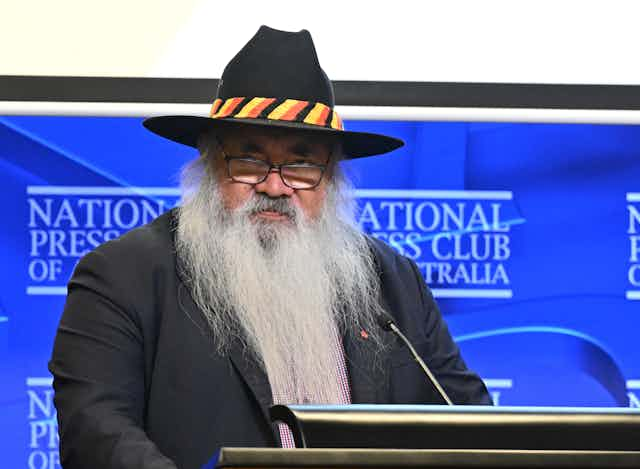Labor senator Pat Dodson, often dubbed “the father of reconciliation”, is quitting parliament due to ill health.
Dodson, 75, told the Labor caucus on Tuesday he would resign as a senator for Western Australia, effective from January 26, Australia Day.
“Regrettably, my recent treatment for cancer means that my health, although slowly improving, has left me physically unable to fulfil satisfactorily my duties as a senator,” Dodson said in a statement.
Anthony Albanese paid tribute to Dodson at the meeting. The Indigenous caucus members stood with Dodson at the lectern, and there was a long standing ovation for him.
Albanese said in a statement: “You would gladly follow him into battle yet he’s made it his life’s work to make peace.”.
“There are few more reassuring sights in parliament than seeing Patrick and his hat coming down a corridor towards you.”
Priest, activist, academic, politician, Dodson was born in Broome. The family subsequently moved to Katherine in the Northern Territory because of Western Australia’s laws against mixed race families.
In 1960 he and his siblings (including brother Mick, who also became a leading Indigenous figure) were orphaned when their parents died, months apart.
His early experiences had a lifelong impact on Dodson. He said in his first parliamentary speech: “I was hiding in the long grass in the Northern Territory town of Katherine and watched my age-mates being taken by welfare and police.
"In Katherine I also watched in fear as white people were bussed in to the town hall meeting, where they vented their hatred and anger against Aboriginal stockworkers for walking off Wave Hill Station and for demanding justice and equal wages. The Australian law at that time was unarguably founded on a social outlook that was highly ethnocentric, even racist.”
At school at Monivae College in Hamilton Victoria, Dodson became head prefect. He studied for the priesthood, and was ordained as the first Aboriginal Catholic priest in 1975. Later he quit the priesthood, unable to reconcile Catholicism with Aboriginal spiritual beliefs.
Dodson was director of the Central and Kimberley Land Councils, and negotiated the return of Uluru (Ayers Rock) to the traditional owners.
He served on the Royal Commission into Aboriginal Deaths in Custody, was the founding chair of the Council for Aboriginal Reconciliation (1991-97), and co-chair of the Expert Panel for Constitutional Recognition of Indigenous Australians (2010-16).
He filled a casual Senate vacancy in 2016. In Tuesday’s statement he thanked former leader Bill Shorten for nominating him for the vacancy.
In the Albanese government he has been Special Envoy for Reconciliation and Implementation of the Uluru Statement from the Heart.
His serious illness prevented him from all but minimal campaigning in the Voice referendum.
When parliament was debating the bill for the referendum, Dodson was too unwell to attend in person – Senate leader Penny Wong read a message from him.
His message said: “This move to recognise the First Peoples of Australia in the Constitution is part of an action of restorative justice. Doing this will give a sense of honour for all Australians, as we collectively stand with courage to face these past legacies and ensure that they are not bequeathed to future generations. This is one commitment our generation can make.”
Dodson in his statement placed on the record his “high regard” for Albanese’s decision to proceed with the referendum.
UPDATE: Dodson says referendum defeat leaves ‘an Australian problem’
Dodson told a news conference the referendum’s defeat left “a problem for Australia”.
“That 60-40 spread of that vote makes it an Australian problem. It’s not an Aboriginal problem,” he said.
“We need to seriously think now of the way in which our civil society knits together with this diversity and differences.”
Asked how the country should chart a way forward, Dodson pointed to three things in Indigenous affairs.
One was closing the gap in relation to the social inequities First Peoples suffered as citizens. The second was to go back and look at the human rights declaration on Indigenous people’s rights.
“The third matter that we should seriously start to look at […] is how to enable First Peoples to create the economic independence that they can do by leveraging up their asset bases, and that’s not only those physical asset bases they hold, but also those ones that have been alienated from them.”

